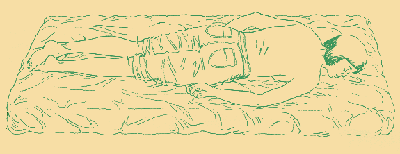Thin, solid, sterile stainless steel acupuncture needles are inserted into acupuncture points to communicate from the outside to the inside. Acupuncture mobilizes Qi, Moisture, Blood, invigorating proper function of the muscles, nerves, vessels, glands, and organs.

"For months my blood pressure was so high that I was dizzy all the time and couldn't stand up. I was frightened because it was barely under control with medication. Within 48 hours after one of my acupuncture treatments, the pressure dropped so low that my doctor had to take me off medication. It remained normal and I can walk around now without feeling dizzy"--Esther Zipin, age 88
How It Feels
Insertion of the needles goes unnoticed by some, and to others feels like a small pinch followed by a sensation of tingling, numbness, ache, traveling warmth, or heaviness. Sometimes people feel Qi moving at distance from the point of insertion. Needles remain in place for twenty to forty minutes. Usually relaxation and an elevation of spirit accompanies treatment. It is as normal to want to continue resting as it is to be immediately energized. Some notice a relief of symptoms or feel more energetic in the days that follow treatment. Most people are pleased to find that sessions are not uncomfortable and even look forward to them.
"I had been diagnosed as having chronic prostitis and urethritis which antibiotics hadn't helped long-term. After ten acupuncture treatments my difficult urination and painful ejaculations disappeared."--Emillio Perez, age 51
What Acupuncture Can Treat
It would be most accurate to say that acupuncture treats disorders of Qi, Blood, and Moisture, and disturbances of the Organ Networks-but this does not correspond to the Western vocabulary of named diseases and conditions.
Acupuncture may be helpful for: Withdrawl from addictions such as sugar, coffee, cigatettes, alcohol, and cocaine; stress reduction; post surgical recovery; chronic fatigue; the signs of aging; and decreased immunity. Some of the many conditions for which acupuncture is considered appropriate are listed by the World Health Organization of the United Nations:
Infections
colds and flu
bronchitis
hepatitis |
|
Muskulo-Skeletal
and Neurologic
arthritis
neuragia
sciatica
back pain
bursitis
tendonitis
stiff neck
Bell's palsy
trigeminal neuralgia
headache
stroke
cerebral palsy
polio
sprains |
Internal
hypoglycemia
asthma
high blood pressure
ulcers
colitis
indigestion
hemorrhoids
diarrhea
constipation
diabetes |
Eyes-Ears-Nose-Throat
deafness
ringing in the ears
earaches
poor eyesight
dizziness
sinus infection
sore throat
hay fever |
|
Genito-Urinary
and Reproductive
impotence
infertility
pre-menstural syndrome (PMS)
pelvic inflamitory disease (PID)
vaginitis
irregular period or cramps
morning sickness
CONTINUED Previous 1 2 3 4 5 6 7 Next
 | Harriet Beinfield, L.Ac. and Efrem Korngold, L.Ac., O.M.D. have pioneered the practice of Chinese medicine in America for the last 28 years as educators, writers, and practitioners. They are the co-authors of the......more |
|
|
Popular Related Articles/Areas
Popular & Related Products
Popular & Featured Events
Dimensions of Wellness
|
|